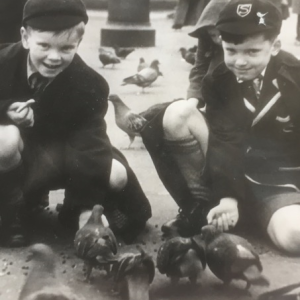
Our project's title 'From Feed the Birds to Do Not Feed the Animals' alludes to the changing attitudes and conflicting messages around people feeding animals. 'Feed the Birds' is the title of a song from the musical film adaptation of the classic children's story Mary Poppins. In the story, an elderly woman sells bird seed in London's Trafalgar Square so that visitors can feed the pigeons, reflecting the reality of a practice which was popular from the Victorian period until it was banned in the early 2000s and which is still carried out in Piazza San Marco, Venice.
'Do Not Feed the Animals' is wording commonly seen on signs instructing, and warning, people against feeding animals at public parks, zoos, beaches and many other places. The motivation behind the signs is sometimes for the benefit of people, sometimes for the benefit of the animals themselves, sometimes for the sake of the environment, and sometimes for a combination of all these things. What's interesting is not only that these signs are 'necessary' in the first place (why do we have to be told not to feed animals? why are we interested in doing so in the first place?) but also that they are often ignored (why are we so determined to feed animals, even when we're told that it might have negative consequences?).
Indeed, humans appear to have been feeding other animals for almost as long as we have been human. These practices are traceable in the archeological record and continue into historical time, having significant impacts on humans, animals and the environment throughout. These impacts are most clearly seen and felt through domestication, a process which is inextricably linked to human feeding of animals and which has profoundly changed the animals, humans and environments involved, in some cases almost beyond recognition.
This project investigates the drivers and consequences of animal feeding, including these impacts (such as changes in diet, transmission of disease, alterations in social groupings, habits and governance) including the extent to which domestication is not merely continuing but accelerating, associated with the far-reaching consequences of the Anthropocene.
The project will seek to establish the drivers and consequences of this feeding by focussing on three main areas:
- Human feeding of domesticated cats (including pets and feral cats)
- Human feeding of birds (including pigeons whether they be wild, feral or domestic, and other garden and urban birds)
- Human feeding of captive wild animals in zoos
The research takes a long view, tracing these processes in Britain from ancient to modern times. In addition, the project has adopted an ‘engaged research’ approach so that stakeholders participate at all stages of the process to co-create the research questions and outcomes.
The project is inter-disciplinary (involving anthropologists, geochemists, sociologists and zooarchaeologists) and trans-institutional, with team members at the National Museums Scotland and the universities of Exeter, Roehampton and Reading. Transdisciplinary, engaged research of this kind can advance and enhance human, animal, and environment health (One Health) and this project very much seeks to make a positive contribution in this area, particularly by collaborating with our research partners and research network.
Picture copyright: Virginia Thomas, may not be copied or reused under any circumstances.
